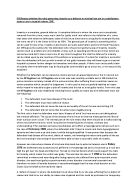'Disease of the mind' is a legal, not a medical, term. In Kemp (1957), D made an entirely motiveless and irrational attack on his wife with a hammer. He was charged with inflicting grievous bodily harm. He was suffering from arteriosclerosis, or hardening of the arteries, causing a congestion of blood on the brain. This produced a temporary loss of consciousness, during which time D attacked. He admitted that he was suffering a 'defect of reason', but argued that this did not arise from a 'disease of the mind'. He argued that arteriosclerosis was a physical, as opposed to mental, disease. A physical disease which caused the brain cells to deteriorate would be a disease of the mind but, until that happened, his condition was a temporary interference with the working of the brain, comparable with concussion. Therefore, the true defence was sane automatism entitling him to an acquittal.
The law draws a distinction between two causes of automatism:
Automatism caused by a "disease of the mind" (insane automatism). Here the M'Naghten Rules apply, and the verdict should be one of not guilty by reason of insanity.
Automatism not caused by a "disease of the mind' (sane automatism). Here the verdict is an acquittal - unless D’s condition was self-inflicted, e.g. by drink or drugs, as in Lipman (1970).
The question of whether D's condition is sane or insane automatism is one of law for the judge (Bratty 1963). Judges base their decision on medical evidence. However, because disease of the mind is a legal concept, judges will also take account of policy. There have been two distinct approaches: The continuing danger theory, which says that any condition likely to present a recurring danger to the public should be treated as insanity and the external cause theory, which says that conditions stemming from the psychological or emotional makeup of the accused, rather than from some external factor, should lead to a finding of insanity.
The word 'insanity' is itself inappropriate in many cases and stigmatising in all of them, many defendants plead guilty when they learn they will be labelled insane. The Butler Committee and, more recently, the Law Commission's Criminal Code Bill (1989), at least recommend a change to 'mental disorder' - defined broadly so as to include mental illness, arrested or incomplete development of mind, and psychopathic disorders. This change has been effected in Canada which is persuasive precedent for the English courts. A finding of insanity may well result in indefinite confinement in a hospital, whereas a conviction for murder may well result in a determinate sentence of between ten and fifteen years; faced with this choice, it may be that most defendants would prefer the certainty of the latter.
The defence is based on a legal definition of insanity, not a medical one. 'Disease of the mind' is a meaningless concept to any psychiatrist therefore medical evidence is almost made redundant. The legal definition of insanity has not advanced significantly since 1843; in 1953 evidence was given to the Royal Commission on Capital Punishment that doctors even then regarded the legal definition to be obsolete and misleading. This distinction has led to absurdities such as (a) even though a legal definition suffices, mandatory hospitalisation can be ordered in cases of murder; if the defendant is not medically insane, there is little point in requiring medical treatment. The over-reliance on the external factor test produces bizarre abnormalities (Quick and Hennessy). It means that diabetics (sometimes), epileptics and sleepwalkers are legally, but not medically, insane. This is a huge contradiction and does not follow what is now understood in our advanced medical world. The rules currently do not distinguish between defendants who represent a public danger and those who do not. Illnesses such as diabetes and epilepsy can be controlled by medication such that sufferers are less likely to have temporary aberrations of mental capacity, but the law does not recognise this.
The emphasis on legality in deciding whether D knew his acts were 'wrong' is inappropriate and too narrow as there is no way to define ‘wrong’ as it changes in all situations.
In summary the rules governing insanity as a defence in criminal law are not in a satisfactory condition as they have not changed since 1843, yet medical science and opinions have developed and allowed greater understanding of mental defects. This wide gulf of knowledge between the law and medical science has led to unsatisfactory rulings such as in Quick and Hennessy.








